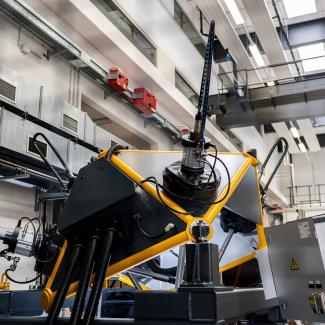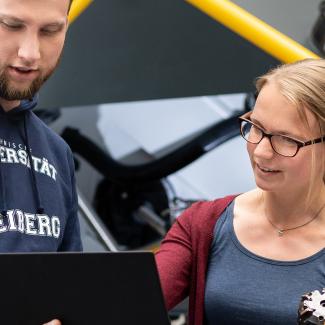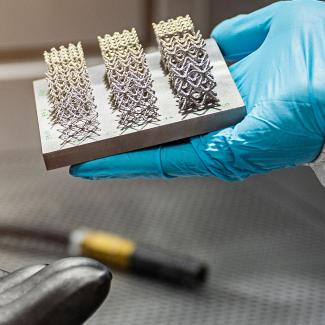Engineering
Are you interested in an engineering degree programme, but still undecided as to which discipline you would like to study? Then the Bachelor's degree programme in Engineering could be just right for you.
How the degree programme works in a nutshell: In the first three semesters, you will get to know and understand the variety of engineering disciplines and their scientific and engineering fundamentals. Only after the third semester, when you have a concrete idea of what is actually behind the various engineering disciplines, do you decide on a partial degree programme. You can choose from these sub-degree programmes after the third semester:
- Mechanical Engineering
- Process Engineering & Chemical Engineering
- Energy Engineering
- Environmental Engineering
- Technology and application of non-metallic materials
- Responsible Production and Consumption
From the fourth semester onwards, you will acquire specialist knowledge and skills in your sub-degree programme, which will either provide you with excellent qualifications for a further Master's degree programme or for your chosen career.
By the way: Even though we call this degree programme "Bachelor's degree programme in Engineering", your degree will be a Bachelor of Science (B.Sc.). Your partial degree programme will be indicated on your degree certificate.
You will quickly realise that the first three semesters of the Bachelor's degree programme in Engineering differ only marginally from the first three semesters of the other engineering degree programmes at our faculty (Diploma Mechanical Engineering, Diploma Process Engineering & Chemical Engineering). By choosing the Bachelor's degree programme in Engineering, you are not making any compromises in terms of the quality of the programme and your qualifications, but you only commit to your discipline after the third semester.
What else needs to be said:
When we developed the Bachelor's degree programme in Engineering together with committed students at our faculty in 2020, the following was very important to us in terms of study ability:
- Relatively few exams per examination period: you don't have to rush from exam to exam, but have the time and opportunity to really get to grips with the material and learn it for long-term memory.
- Early contact (from the second semester) with modules with engineering applications and reference to current research work: This keeps your motivation for the engineering degree programme at a high level even during the otherwise long "dry spell" of basic science and engineering training (the first four semesters).
- Individual options by choosing compulsory elective modules from a predetermined module catalogue and by choosing free elective modules: you can develop flexibly according to your engineering interests and have the opportunity to think outside the box.
- You gain practical and research experience in the basic internship, during two specialist excursions, a student research project, a 14-week specialist internship and a Bachelor's thesis.
- An education in the specialised language of English and introductory business administration will also provide you with the basis for success in an international environment.
We, the study committee, are convinced that with the Bachelor's degree programme in Engineering, we are providing a flexible yet rigorous undergraduate degree programme that will prepare you excellently for future job profiles in further engineering degree programmes in industry, business and science, taking your interests into account.
We will be happy to support you. If you have any questions about the programme, please give us a call.
Partial study programmes
The mechanical engineering programme deals with issues relating to the development, production and operation of machines, systems and vehicles. The programme focuses in particular on design and calculation as well as the underlying mechanics, electrical drive technology and automation. In addition, there are industry-specific programmes such as electromobility, machines for raw materials processing and extraction as well as cross-industry programmes such as simulation and additive manufacturing. Thanks to its broad applicability, mechanical engineering enables students to deal with current and future challenges from all areas of the economy.
Process Engineering and Chemical Engineering is the engineering science of mechanical, thermal, chemical and biological material conversion with a particular focus on economic efficiency and sustainability. For example, plastic waste or agricultural residues to fuels or basic chemicals; basic chemicals to recyclable materials; renewable raw materials to energy; milk to yoghurt; hops, malt and water to beer or even soil, water and air pollution control. The interdisciplinary specialisation provides training in all areas of process engineering and chemical engineering and results in a balanced relationship between fundamentals and their applications.
Energy Technology deals with the technologies required to provide, distribute and utilise electrical energy, heat or another form of energy in an environmentally friendly, efficient, safe, economical and future-oriented manner. In addition to advanced lectures on thermodynamics and fluid mechanics, decentralised and regenerative energy generation, energy storage and efficient combustion technology are also covered. Supplementary courses on simulation methods and energy economics prepare graduates for solving future problems in the energy sector.
The Environmental Engineering ensures environmental compatibility, social acceptance and international competitiveness in the design, construction and operation of technical facilities. The focus is on projects for the protection of the environment, the sustainable use of resources, the recycling of residual materials and the closing of material cycles. The practical specialisation for this takes place in various areas of process engineering, chemistry and biology. It is geared towards acquiring teamwork skills and preparing students for lifelong learning in order to maintain a balance between technology and the environment for future generations.
The Technology and Application of Non-Metallic Materials focusses on the materials of the future for industry. From glass fibres and heat-insulating building materials to ceramic heat shields for space technology. In the process engineering specialisation, classic areas of application such as porcelain, container glass or bricks and high-tech developments such as smart glass, diesel soot filters and fibre concretes come together. During production, from the raw material to the finished product, there are numerous tasks that need to be solved using interdisciplinary expertise. Knowledge of raw materials and their properties, energy-efficient processes and equipment for the various technologies, the wide range of materials, testing and analysis methods are taught, as are aspects of environmental protection, marketing and quality assurance.
Students on the "Responsible Production and Consumption" sub-degree programme become European experts in sustainability. They gain a critical awareness of the responsible use of resources and goods. Based on engineering fundamentals, they develop the ability to recognise technical, economic, social and legal aspects of sustainable production.
- Faculty
-
Faculty of Mechanical, Process and Energy Engineering (Faculty 4)
- Degree
-
Bachelor of Science (B. Sc.)
- Standard period of study
-
7 Semester
- Part-time possible
-
No
- Start of studies
-
Winter semesterSummer semester
- Admission requirement
-
Abitur or subject-specific higher education entrance qualification or an entrance qualification recognised as equivalent
Language requirement
- Application: with at least B1 level German
- Admission to the degree program: with C1 level German (e.g. DSH-2)
- language courses and DSH exam at TUBAF
- Course language
-
German
According to the sub-degree programs in the relevant industries, educational institutions, research institutions, and authorities.
Why study engineering at TUBAF?
- Because you have already decided in favour of engineering, but are still undecided about the exact engineering discipline
- Because the needs of the students are strongly taken into account (manageable number of examinations, stringent study options, elective options, application and research relevance at an early stage of the degree programme)
- Because you value short distances and personal contact with lecturers
- Because you would like to benefit from the lecturers' international contacts and be supported in organising a semester abroad or your Bachelor's thesis at an international research institution (we are happy to arrange this)
- . (we will be happy to put you in touch)
- Because you may want to work as a paid research assistant on current research projects and thus gain insights into current research (we need your support for our research projects)
- Because TUBAF has excellent contacts with sponsors, who support our students in the form of scholarships (scholarship chances are quite high!)
- Because we prioritise our students, precisely because we are a small but very research-intensive university. Our graduates are also our doctoral students of tomorrow, with whom we enjoy researching the challenges of the future together!
- Because life (including housing) in Freiberg is not as overpriced as in some other university towns
Suitable advanced degree programmes at TUBAF
- Master Mechanical Engineering
- Master of Process Engineering
- Master of Energy Engineering
- Master of Environmental Engineering (from summer semester 2024)
- Master of Ceramics, Glass and Building Materials Technology
- Diploma postgraduate programme in Environmental Process Engineering
Interests and skills you should bring with you
Basic understanding of maths and science subjects. No advanced course level required. Much more important are an interest in engineering, enthusiasm for new things, perseverance and some self-discipline and ambition.
A 6-week basic internship is required for this degree programme (30 working days). Completion or partial completion before the degree programme (after the Abitur) is recommended. The internship can also be completed during the degree programme. Requirements for the basic internship can be found in the adjacent download. Dr Andrea Dög will be happy to answer any questions you may have (see the box on the right "Specialist advice").
Introduction to the degree programme
Bachelor's degree programme in Engineering with six sub-degree programmes
Fascination with technology - study engineering in Freiberg



